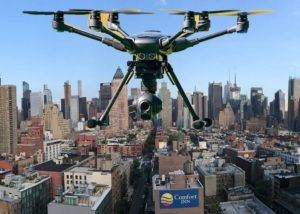And it could violate inmates’ rights.


Power suits, robotaxis, Leonardo da Vinci mania—just a few of the things to look out for in 2019. But what else will make our top ten stories for the year ahead?
Click here to subscribe to The Economist on YouTube: https://econ.st/2xvTKdy
What will be the biggest stories of the year ahead?
00:35 — 10 — Powered Clothing.
In 2019 power dressing will take on a whole new meaning when this strange-looking clothing hits the market. Not so much high fashion as high tech, it’s a suit with built-in power that will literally get people moving. Part of the wearable robotics revolution, the suit is made up of battery-powered muscle packs which contract just like a human muscle to boost the wearer’s strength. With the global population of over 60s expected to more than double by 2050, and retirement age increasing, there’s no shortage of potential markets. But don’t expect the suits to ease the burden on aching limbs and overstretched health services anytime soon — as these suits don’t come cheap. According to the manufacturer they’ll retail for around the cost of a bespoke tailored suit.
02:13 — 9 — The year of cheap flights.
2019 will be the year low-cost long-haul travel takes off. You’ll be able to buy a ten thousand mile flight from London to Sydney for around $350 and this is why. The world will boast two new state-of-the-art mega hub airports and competition between them will drive down the cost of flying. Daxing Airport outside Beijing is due to open in 2019 and will feed growing demand for air travel in China. Beijing already has one of the world’s biggest airports and for China this new mega hub will send an important message to the world. Rivaling Daxing as a national symbol of global prestige will be a new mega hub airport in Istanbul. Opened in 2018 it covers a staggering 26 square miles — an area larger than the island of Manhattan. And in 2019 consumers will again be the beneficiaries of a state sponsored economic push. But the low fares offered by competition between these hubs could be short-lived.
04:06 — 8 Stonewall riots at 50.

Answer: Quite possibly because Facebook’s already forced you to log out and back into your account today.
The news: Facebook said hackers exploited a software flaw to access the records of almost 50 million customers. The firm said it had fixed the vulnerability and reported the breach to law enforcement.
The hack: The company said that the hackers had exploited a coding glitch that affected the service’s “View As” feature, which lets people see what their own profile looks like when someone else takes a look at it online. This allowed them to get hold of digital “tokens,” which are software keys that let people access their account without having to log back in every time.

While facial recognition performs well in controlled environments (like photos taken at borders), they struggle to identify faces in the wild. According to data released under the UK’s Freedom of Information laws, the Metropolitan’s AFR system has a 98 percent false positive rate — meaning that 98 percent of the “matches” it makes are of innocent people.
The head of London’s Metropolitan Police force has defended the organization’s ongoing trials of automated facial recognition systems, despite legal challenges and criticisms that the technology is “almost entirely inaccurate.”
According to a report from The Register, UK Metropolitan Police commissioner Cressida Dick said on Wednesday that she did not expect the technology to lead to “lots of arrests,” but argued that the public “expect[s]” law enforcement to test such cutting-edge systems.

SAN FRANCISCO (Reuters) — The U.S. government is trying to force Facebook Inc ( FB.O ) to break the encryption in its popular Messenger app so law enforcement may listen to a suspect’s voice conversations in a criminal probe, three people briefed on the case said, resurrecting the issue of whether companies can be compelled to alter their products to enable surveillance.
The previously unreported case in a federal court in California is proceeding under seal, so no filings are publicly available, but the three people told Reuters that Facebook is contesting the U.S. Department of Justice’s demand.
The judge in the Messenger case heard arguments on Tuesday on a government motion to hold Facebook in contempt of court for refusing to carry out the surveillance request, according to the sources, who spoke on condition of anonymity.

Until this past year, consumer drones carried tiny ultralight cameras, but they just didn’t have the energy or the reserve to carry much else. They certainly could not deliver much of a product or payload. They flew for 15 minutes, lacked the capacity to carry excess weight, and had short range.
But market demand sparks innovation. Amazon and Domino’s Pizza are experimenting with drone delivery. The improvements needed to serve these needs are quickly bubbling down to unlicensed weekend pilots. Hexacopters with 4K cameras, gimbals and retracting landing gear are available for under $400. Tiny foldable drones with 720p cameras are available for $35. Some models don’t even need a pilot on a joystick. You can preprogram the flight path to reach any target using GPS, or you can guide them by making gestures with your hand. The drone actually looks back over its shoulder and responds to your hand-waving commands.

Lance Ulanoff is a cartoonist and robotics fantech expert. But he shares a lot in common with Wild Ducks. He is an eclectic journalist and social media commentator.
This month he began publishing at Medium.com, and I’m glad he did! Lance has a knack for going beyond the Who, What, Why. Even in a short article, he explains the social implications. He provokes us to recognize why it matters.
Lance breaks down the recent attempt to assassinate Venezuela’s president with a drone delivered explosive and raises our social antennae. This news event ushers in a grim technology era. Ulanoff points out that in a short time, it has become inexpensive and fairly easy to send an explosive directly into a national monument like the Statue of Liberty.
Photos: Venezuela President, Nicolás Maduro, reacts to incoming drone. Although the assassination attempt failed, others on the ground were injured.
Philip Raymond co-chairs CRYPSA, hosts the New York Bitcoin Event and is keynote speaker at Cryptocurrency Conferences. He sits on the New Money Systems board of Lifeboat Foundation and is a top Bitcoin writer at Quora. Book a presentation or consulting engagement.

We’ve heard so many stories lately about the frankly horrifying degree to which facial recognition leads to tracking or privacy invasions. But a startup specializing in AI is instead leveraging facial recognition technology to find human trafficking victims.
Marinus Analytics is a startup that licenses technology to law enforcement with the express purpose of fighting human trafficking. It’s founder and CEO, Emily Kennedy, created a program called Traffic Jam during her time at Carnegie Mellon that uses AI tools to identify victims. Nowadays, Traffic Jam is available to any law enforcement agency that works with Marinus.
According to Marinus’ website:

While facial recognition performs well in controlled environments (like photos taken at borders), they struggle to identify faces in the wild. According to data released under the UK’s Freedom of Information laws, the Metropolitan’s AFR system has a 98 percent false positive rate — meaning that 98 percent of the “matches” it makes are of innocent people.
The head of London’s Metropolitan Police force has defended the organization’s ongoing trials of automated facial recognition systems, despite legal challenges and criticisms that the technology is “almost entirely inaccurate.”
According to a report from The Register, UK Metropolitan Police commissioner Cressida Dick said on Wednesday that she did not expect the technology to lead to “lots of arrests,” but argued that the public “expect[s]” law enforcement to test such cutting-edge systems.

And that’s just one of the ways bad guys are putting drones to use, law enforcement officials say.
DENVER, Colorado — Last winter, on the outskirts of a large U.S. city, an FBI hostage rescue team set up an elevated observation post to assess an unfolding situation. Soon they heard the buzz of small drones — and then the tiny aircraft were all around them, swooping past in a series of “high-speed low passes at the agents in the observation post to flush them,” the head of the agency’s operational technology law unit told attendees of the AUVSI Xponential conference here. Result: “We were then blind,” said Joe Mazel, meaning the group lost situational awareness of the target. “It definitely presented some challenges.”
The incident remains “law enforcement-sensitive,” Mazel said Wednesday, declining to say just where or when it took place. But it shows how criminal groups are using small drones for increasingly elaborate crimes.
There are a list of thousands of vehicles that have been tweaked for speed, riveting performance and exhilarating power that’s built and tested to be taken to extremes.
Due to the increasing number of millionaires and their treasured toys, this was definitely a wake up call for the police forces to step their game up and to put a counter measure leverage system into place by upgrading their state vehicles so that they aren’t easily intimidated or outrun by the reckless speedsters on the move. We are to take a look at 10 of the best Police Cars in the world.
Nissan Skyline GTR Good ol’ Japan can be give an award for their ability to swiftly develop and adapt to ever-changing times and situations and we can gladly take out hats off for the National Japanese Law Enforcement We immediately see a lot of scope when it comes to a masculine defining car such as the Nissan skyline which is commonly known for its racing abilities as made famous in “The Fast And Furious” Movie as well.